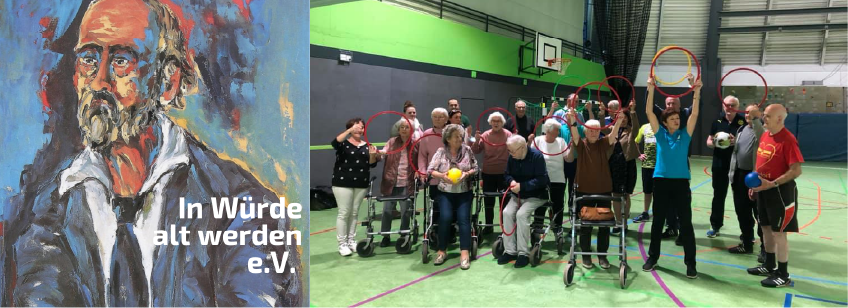medicalvalues: You founded the association “In Würde alt werden e.V. “. What does this name mean to you?
Weber: The term “dignity” is increasingly losing its meaning in our society, especially with regard to older people. We live in a world that always wants to go higher, faster, further. The very elderly in our society quickly get sidelined. They slow us down. In our society, “finiteness” is faded out. Pharmacology and medical technology suggest to people that there is a solution for everything and that growing old is easy. This is a development that urgently needs to be countered. That is why we founded the association. We want to draw attention to the situation with our actions and show ways of growing old in dignity. So the name seemed fitting to us.
medicalvalues: Why did you found the association? Are old people currently unable to live in dignity in Germany?
Weber: Yes, there is a certain group of people who can currently live with dignity in Germany. However, the number of those who can no longer do so is growing steadily. As long as a person is functioning, can take care of himself and is not dependent on help, everything is fine. Then something unforeseen happens. A fall that leads to a broken bone, a serious illness, a drastic experience, etc.. And the motor no longer runs as it should. Suddenly you need help. The current hospital structures are geared to focus on the monetary aspect. This often results in the so-called “bloody discharge” and the all-encompassing question of further care. The nursing crisis is omnipresent and the following care structures are manageable and do not meet the medical and professional demands. Relatives are working, homes are overcrowded and hospitals need free bed capacities for lucrative interventions. How is it possible to live in dignity? The “elderly” are deported.
medicalvalues: You offer support for care in old people’s homes. What do you notice?
Weber: The old people’s homes are overburdened with the care of, for example, freshly operated patients. Questions arise, such as: Is everything all right with the surgical wound? Is the patient allowed to get up, even if he is still in pain? How do I move the patient correctly? Are the medicines still correct? Out of fear of making mistakes, patients are then often sent back to hospital (the so-called revolving-door effect). A large part of these problems arise from the fact that the care home structures and the professional expertise of the nurses are not sufficient with regard to such a patient clientele. Today’s nursing homes are dependencies of clinics.
The family doctors are usually general practitioners and not experts in surgical-traumatological care. The cooperation with them has become more intensive in recent years, as the win-win situation is becoming clearer for all involved.
medicalvalues: You are also very active in Cuba. What do you notice in comparison to geriatric care in Germany?
Weber: In Cuba, people are masters of improvisation. High-tech equipment is scarce. Different standards are set. They pay more attention to the patients and the people behind them. The elderly are valued and have their place in the midst of society and not on the margins.
medicalvalues: You focus especially on the diseases dementia, depression and sarcopenia, as well as fractures in old age. Why?
Weber: Through my many years of working as a geriatric traumatologist, I have noticed that most patients have at least one of these three clinical pictures. When you start talking, you quickly notice that people carry a lot of baggage with them. They are now in hospital and come to think. Old baggage is being dealt with. They are withdrawing. They don’t want to be a burden on anyone. Depression is one of the most common illnesses in old age. In 2030 it will be the most common disease in old age. People don’t go outdoors as often as before. There is a lack of exercise. Muscle loss is advancing. If you are not careful, the next fall is inevitable. This is where we have to start and get people out of their “hole”. The third point is dementia. This is a topic that people don’t like to talk about. You have to educate people and show them ways to deal with a patient with dementia. You have to lose the fear of it and understand the disease.
medicalvalues: Mulimorbidity, polypharmacy and frailty are only some of the phenomena that affect aging people and make medical care more difficult. What would you like to see from the doctors treating them?
Weber: More empathy in dealing with older people in the knowledge that in the medium term they themselves will be the aging person with all the associated infirmities. Time is the most important factor in treating older people, due to physical and cognitive limitations. Here, the so-called “brothel medicine” does not work. That is to say, in to the hospital, short number and out again. Here I agree with the statement of an older colleague.
medicalvalues: Germany has one of the most highly developed health care systems in the world. What has to happen so that elderly people can live here with dignity?
Weber: Yes, we are a highly developed health system. But only if the patient is financially interesting and represents a corresponding intersection in the sense of the importance of the existing medical-functional apparatus (hospital operators are currently focusing on surgical interventions of different specialities, as these are the most lucrative in the existing remuneration system). Unfortunately, in the sense of a hospital’s mission to provide care, the less lucrative departments fall by the wayside, which contradicts the mission to provide care. A measured attention to economic efficiency would be a start. Elderly people need a lobby, especially since they are classified as a total loss from an economic point of view.
medicalvalues: What concrete measures do you take to ensure dignified ageing?
Weber: We have the ISKA visitation project in the nursing homes and look at the patients on site, answer questions and check the wounds and medicines and support the nursing staff with words and deeds. This often saves the nursing home residents from having to be transported to hospital. We are contact persons, advisors and bridge builders. Things as simple as a hotline make it possible to be the contact person for the homes, relatives and family doctors in a short time.
Furthermore, we have built up an extensive network with experts from the fields of medicine and care and health insurance companies.
We raise awareness with our musical theatre. First of all, people have to be made aware of the problems. We want to show people ways of what is still possible in old age, e.g. through our senior sports project. We want to achieve with further projects that seniors are more a part of society.
medicalvalues: How can the digitalisation of the health system help to improve geriatric care?
Weber: Through digitalisation with, for example, an app, you can collect geriatric assessments in the areas of mobility, cognition and emotional state and thus detect changes at an early stage and counteract them. One can also assess gait patterns, examine wounds and observe mobilisation from a distance through photo/video recordings. Digitalisation enables faster and simplified communication. Politicians are calling for intersectoral integration between inpatient and outpatient treatment. We have been doing grassroots work in this area for years and the requests from nursing homes are steadily increasing. The medium of AI is a is a wonderful addition.
medicalvalues: What do you wish for your own ageing in the future?
Weber: To be treated with dignity and respect. To remain active and participate in social life.
medicalvalues: How good are the chances that your wishes will come true?
Weber: If we succeed in reaching society and raising awareness, then we have a good chance of growing old in dignity. However, politics also has a responsibility here. What makes me particularly hopeful is that the young generation is analysing the current system in detail and developing many proposals for improvement.



